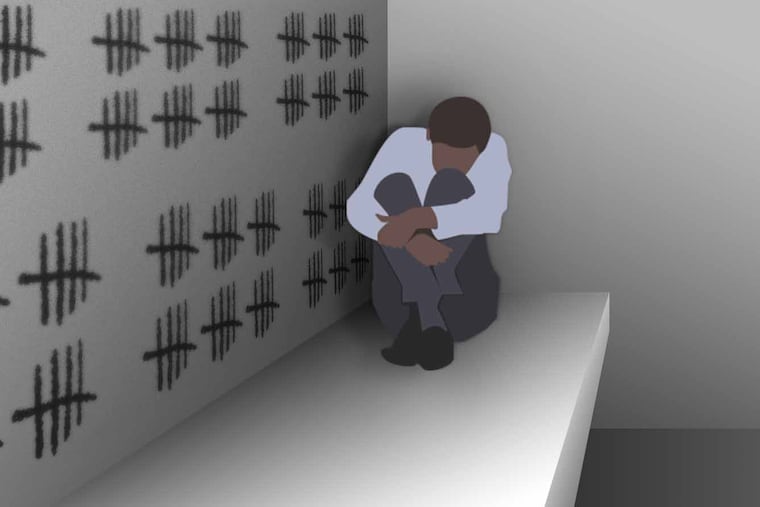I spent 14 years in solitary confinement. Here’s why we should end the practice.
Solitary confinement took away a piece of me that I will never get back. It's also more expensive and hurts prisoners' mental health.

During the 37 years that I was incarcerated, I quickly and continuously learned that the prison system prioritizes arbitrary control over humanity.
One day, I found my friend laying on a staircase with severe stomach pain. Although he had been vomiting and could not walk, the guards denied him access to the medical unit. In protest, I refused to go back to my cell, ignoring a guard’s order, until my friend received medical attention. Due to the commotion I caused, the staff finally agreed to examine him, and he was almost immediately sent off to the emergency room. While my friend was getting a lifesaving colon surgery, I was handcuffed and moved to solitary confinement, charged with disrupting the order of the prison.
Doctors said that my friend would have died within 24 hours if he had not received medical care. My disobedience saved his life. But it sent me to solitary confinement for two years.
That wasn’t the only time I was sent to solitary confinement; it’s how I spent over a third of my time in prison. When I spoke out against the cold, uncooked food and refused to eat, I was put in solitary confinement. When I wore socks that were not sold at the prison store, I was put in solitary confinement. When I left my shirt untucked or cuffed my pants, I was put in solitary confinement. Each time I went to solitary confinement, it was clear that it was meant to control my every move and not to help me or others stay safe — whether I cuffed my pants had no impact on anyone’s safety, let alone anyone’s rehabilitation.
“Solitary confinement ... was meant to control my every move and not to help me or others stay safe.”
My experiences are not unique. According to the Vera Institute of Justice, the most common reason that an incarcerated person is placed in solitary confinement is for nonviolent infractions, including disobeying an order.
The 14 years I served in solitary came at a cost: They chipped away at my positive attitude, my patience, and my personality. I had to spend days, months, and sometimes years on end in a prison cell smaller than the size of a parking space, with the fluorescent lightbulbs shining on me at nearly all hours of the day and illuminating my cell so that I could be surveilled. I was prohibited from speaking to other people. Even if I wanted to seek out human contact by whispering down the hallways, it was hard to find someone in a mentally stable state to talk to for a few minutes here and there. Furthermore, I’d risk getting written up for misconduct.
I knew from that direct experience how cold, isolating, and disconnecting solitary confinement is, but only later did I come to see how widespread and harmful it was. The studies I’ve read since then show what I felt: that instead of increasing public safety, the practice heightens mental health issues, including depression, aggression, and suicidal thoughts. Solitary units are often full of people with serious mental illness. It doesn’t even make financial sense, as housing someone in solitary confinement is about twice as expensive as housing them in the general prison population.
We should not incarcerate people in an environment that worsens mental illnesses, costs significantly more money, decreases public safety, and is extraordinarily cruel.
Since being released five years ago, I have become an advocate for the people I left behind in prison, and I currently work with the Abolitionist Law Center to end the inhumane practices I have experienced. Two years ago, the Abolitionist Law Center helped to ban solitary confinement in Allegheny County prisons through a referendum. Now, in Lackawanna and Lehigh Counties, I’m working with grassroots organizations to collect thousands of signatures in support of ending solitary confinement there as well.
» READ MORE: In prison, a phone was my lifeline. Until I got caught with it. | Opinion
Philadelphia should follow Allegheny, Lackawanna, and Lehigh Counties’ lead. These three counties have thought far ahead of Philadelphia, even though Philadelphia is the birthplace of solitary confinement and prides itself on being more progressive than the rest of the state.
The Philadelphia Department of Prisons, the mayor, and City Council could enact just, humane policies. But in the absence of this, Philadelphians must speak out and take action. I urge you to join the effort to end solitary confinement. You can help collect signatures in Lackawanna and Lehigh Counties and contact your representatives to ban solitary confinement at the state level. Additionally, you can donate to the Solidarity Not Solitary fund to support incarcerated people currently in solitary confinement.
Solitary confinement took away a piece of me that I will never get back. Now, I hope you will join the fight to prevent this torturous experience from plaguing the lives of millions of other incarcerated people.
John Thompson is a social and political organizer with the Abolitionist Law Center, primarily working and advocating to eliminate solitary confinement, death by incarceration, and the release of all aging and geriatric prisoners. He spent over 37 years in prison, after being convicted at the age of 17, and sentenced to death by incarceration.